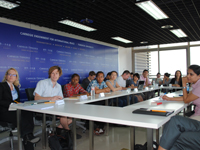Registration
You will receive an email confirming your registration.
IMGXYZ3135IMGZYXChina and India are frequently compared at the economic level, often ignoring the wider spectrum of their regional diplomacy and international engagement. The Carnegie-Tsinghua Center for Global Policy, in the fourth session of its “China and South Asia’s Future” (CSAF) seminar series, explored China and India’s full range of engagement with various regions of the world by hosting a panel of young scholars from several continents. Carnegie’s Lora Saalman moderated.
India, Japan, and UNSC Reform
The current United Nations Security Council (UNSC) has five permanent members—the United States, China, Russia, Great Britain, and France—leading to criticisms of its lack of representation, explained Munchenhagen, a master’s degree student at Tsinghua University from Germany. India, Japan, Germany, and Brazil are widely viewed as the most likely contenders for a permanent seat.
- China’s Stance: While the United States supports Japan and India’s candidacy in the UNSC, China’s response has ranged from silence to staunch opposition, said Munchenhagen. He argued this is due to historical legacies and regional rivalries, combined with China’s desire to preserve its status as the sole Asian permanent UNSC member and its concerns over U.S. ties with India and Japan.
China’s Policies Toward Africa
Korinko, a master’s degree student at Tsinghua University from Kenya, noted that while China has increased its investments in Africa and persuaded the Sudanese government to accept peacekeepers, Beijing should re-label its policy of “non-interference” as “conditional interference,” offering examples:
- Zimbabwe: China’s pursuit of mineral resources is combined with its provision of arms to the Mugabe regime, including jamming devices used against pro-opposition party radio stations and riot gear to counter anti-government demonstrations.
- Angola: China’s quest for oil has led it to indirectly fuel violence and instability with its arms supplies and provide economic support for a widely sanctioned regime, argued Korinko.
- Zambia: China faces public demonstrations over poor working conditions in copper mines, as well as allegations of election interference.
- Sudan: In its hunt for oil reserves, China used its veto at the UN to block sanctions against the al-Bashir regime and provided arms used by the government against the south.
Kazakh Perspectives on China
Turarova, a master’s degree student at Tsinghua University from Kazakhstan, explained that Kazakh politicians view China as an economic and political partner, while academics are more cautious, with some seeing China as a counterbalance to the West and Russia. Among the public, positive views of China exist in Almaty and north, more negative views in central regions, and indifference in the west, east, and south.
- Concerns About China: Turarova argued that historical memory, a shortage of objective or statistical information about Kazakh-Chinese relations, and a preoccupation with China’s rise skews Kazakh assessments of bilateral relations. She cited several Kazakh concerns about China, including:
- Potential territorial expansion, demographic takeover, and use of Xinjiang as a conduit;
- Environmental disaster, such as irrigation projects in Xinjiang;
- Dominance of Chinese goods in the Kazakh market, and a presence in its oil and gas sector;
- Degradation of Kazakh industry and agriculture as a result of China’s economic might.
Southeast Asia and China’s Ambitions
China has the potential to be a responsible stakeholder in Southeast Asia, but the region is still uncertain as to China’s intentions, argued Lim, a master’s degree student at Tsinghua University from Singapore.
- Thailand: Thailand’s strategic engagement with China involves high-level strategic exchanges, arms sales, joint military exercises, and economic partnerships.
- Malaysia: Malaysia has an “apprehensive engagement” with China, in part due to concerns over the South China Sea, regional bilateralism, and domestic Chinese Diaspora, argued Lim.
- Indonesia: Indonesia’s “re-engagement amid uncertainties” with China stems from its dissatisfaction with the West, need for economic recovery, and efforts to maintain territorial integrity, prompting Indonesia to increase bilateral engagement.
- Singapore: Singapore’s “pragmatism” in its relations with China is marked by hedging and engagement under the China-Singapore Free Trade Agreement (CSFTA).
Israel and the China-India Nexus
Davis, a Master’s degree student at Tsinghua University from the United States, noted India approaches Israel with caution due to its large Muslim population, while China hesitates due to close U.S.-Israel ties.
- U.S. Influence: Israel’s arms and technology transfers to both India and China reflect the evolving U.S. perception of those nations. America formerly rejected Israeli military and dual-use transfers to both countries, yet the warming of U.S.-India ties has converted the latter into the “courted,” compared with U.S. efforts to keep China at arms’ length.
Indo-Caribbean Connection
India’s ties with the Caribbean began with the exodus of 500,000 indentured servants in the 1830s, which would later constitute the second-largest ethnic group in the region.
- Natural Partners: Given Indo-Caribbean historical and cultural ties, political systems, models of development and leadership roles in South-South relations, Pile, a master’s degree student at Tsinghua University from Barbados, argued that India has the potential to be the Caribbean’s most natural and influential external hemispheric partner after the European Union.
- EU Model: Pile suggested that India could bring economic and trade balance to the Caribbean, in part by copying the formula used by the EU to encourage close ties to the Caribbean.
China’s Central Asian Strategic Triangle
Hughes, a Master’s degree student at Tsinghua University, outlined China’s chief strategic concerns in Central Asia as stability, including threats from terrorism and ethnic separatism, and energy diversity.
- Investment and Terrorism Flows: Hughes noted that China remains unwilling to spill blood for its investments, particularly in Afghanistan. He also cited China’s concerns over the influx of ethnic separatism and terrorism from Afghanistan into Xinjiang via the East Turkestan Islamic Movement.
- Regional Engagement: As the United States withdraws from the region, Hughes argued that China would be positioned to embark upon greater regional engagement.
Discussants: V.S. Arunachalam, Rukmani Gupta, Reshmi Kazi, Gunjan Singh, Avinash Godbole
